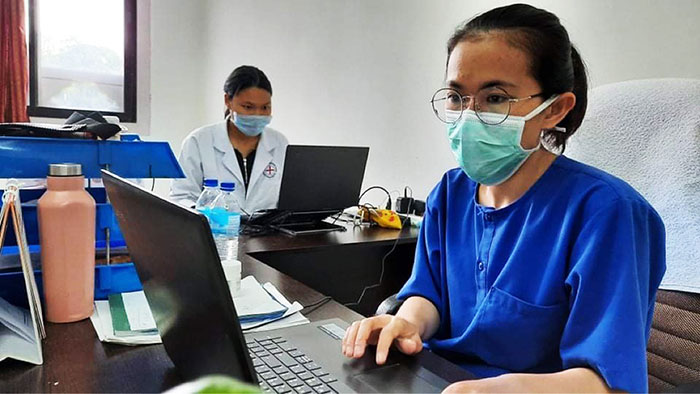The two TICA volunteers are currently working at the RCDC
Younten Tshedup
Behind the face mask and the coveralls (protective suit), it is hard to tell who is who at the virology and molecular laboratory, Royal Centre for Disease Control (RCDC) in Thimphu.
Ever since the detection of the first Covid-19 positive case in the country in March, RCDC has been functioning round the clock. Keeping up with the ever-increasing testing procedures at the facility are the staffs – laboratory technicians.
Among these laboratory officers involved in performing over 4,000 Covid-19 tests daily, there are two foreigners, who have made this facility (on the outskirts of Thimphu) along with the rest, a home for themselves.
Jib and Nisa are from Thailand and currently assisting the RCDC team with the Covid-19 surveillance and testing of samples. They are volunteers sent by the Thailand International Cooperation Agency (TICA).
Things were much easier when they arrived in the country last October. Every weekend there was a hiking schedule planned among the volunteers and other exchange students in the country.
With most of the hiking destinations in the capital completed, the team had just started to explore locations outside Thimphu. It was in the midst of this adventure, Bhutan detected its first Covid-19 positive case on March 5.
Concerned about their safety and wellbeing, TICA wrote to the volunteers asking them to return to their country.
Mashchimaporn Songsang, who is known as Jib among her friends at RCDC said that after the detection of the first case, several samples started to come to the centre from all across the country.
“There were only six people working throughout the night. It was not appropriate to leave them at that time,” she said.
The three volunteers (two at RCDC and one with the health ministry) wrote to the Thai ambassador in Bangladesh requesting to stay behind. “We couldn’t leave the team when they needed us the most so we decided to stay back and help,” said Jib.
Nisanart Yeamkhong (Nisa) said that even if they had returned to Thailand, the situation there was worse than Bhutan. “We wanted to stay back and be useful and productive for Bhutan.”
Nisa, a pharmacist, is mostly engaged in preparatory works for the laboratory and mainly deals with the management of data and surveillance information that comes in.
“Unlike others I do not get involved in the laboratory activities but it has been a big learning opportunity for me working as a team,” said the 25-year-old. “I’ve learned a lot about management and communication skills and, this, I would take it back home and apply there.”
Jib is a medical lab technologist and thus directly involved in the RCDC’s primary function. With a major in microbiology, the 27-year-old was sent to Bhutan to help the RCDC team with the influenza surveillance.
Besides some issues, mostly with food, the two volunteers said they enjoy working in the country. “Since day one, everyone was welcoming and all worked as a team. We are accepted as a part of the team who is working day in and day out to fight the pandemic,” said Nisa.
She said that although their contract expires in October, if the situation in Bhutan does not improve, they would want to stay back and help. “It would be difficult for me personally to leave my team and friends like this in the middle of the pandemic,” she said. “And also if they have to find my replacement, they have to start it all from scratch, wasting precious time and money.”
Just like the rest of the RCDC staff, the two volunteers are also living at the facility following the lockdown.
“I can go home if I want to, but in doing so we miss precious time that can be used to test an additional sample or two,” said Jib. “Although it’s not the most comfortable to stay at, it is no time to look for comfort.”
She said that Bhutan is doing very well in containing the spread of the outbreak after the local transmission was recorded. “People here are very fortunate. There are so many people working so hard to keep you all safe. Please follow the protocols and cooperate with the government and the health ministry.”
Meanwhile, RCDC head, Dr Sonam Wangchuk said that since the detection of the first case in the country, the volunteers have been working equally with the rest.
“They have no complaints. They live in the facility, working 24 hours just like the rest of us. They have been very helpful to us especially in these times.”


